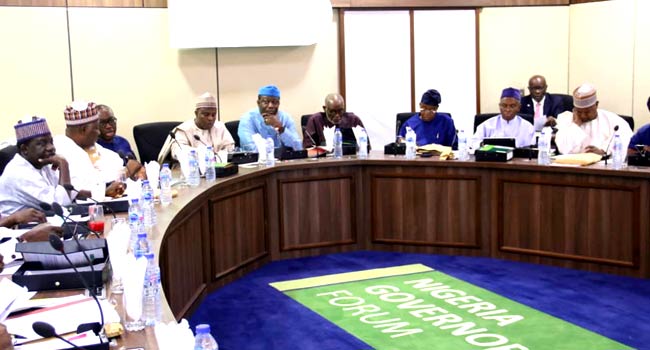Minimum Wage: You Can’t Decide What to Pay, NLC Responds to Governors
The remarks attributed to governors, who stated that states should decide their minimum wage in their respective domains, have been criticised by the Nigeria Labour Congress (NLC).
“This idea is not only authoritarian, but it also attacks the core principle and methodology used to establish a minimum wage in Nigeria,” stated Benson Upah, Head of Information and Public Affairs for the NLC, in a statement released on Friday.
Unions, the state, and businesses have been mired in minimum wage disputes for months.
While organised labour is adamant about N265,000, the tripartite committee on the new minimum wage has offered N62,000.
After receiving the committee’s report, President Bola Tinubu pledged to pay the amount that the government is able to afford. A measure to establish a new minimum wage will be sent to the National Assembly after he consults with relevant parties.
Earlier this week, at a meeting, the Southern Governors’ Forum took the position that minimum wage standards should not be uniform. They kept insisting that states should only pay what they are able to afford.
“The Forum discussed the minimum wage issues demanded by labour and unanimously agreed that the minimum wage should be reflective of the cost of living and ability to pay, and each state should be allowed to negotiate their minimum wage,” a communiqué issued by the governors stated.
The NLC, however, has condemned the governors’ action, claiming that it “threatens the welfare of Nigerian workers and the national economy.”
A nationwide minimum wage is not an abstract idea. Legally, no employer may pay an employee less than this minimum wage, which acts as a national floor. Every legal worker is guaranteed a minimal standard of living by this threshold, which is a collective agreement. Union officials expressed concern that the governors’ desire to set the minimum wage independently undermines this principle and might have negative consequences for Nigerian workers and the economy as a whole.
State pay structures reflect each state’s distinct financial capacities and circumstances; the national minimum wage is not the same as those pay structures, and governors should be reminded of this. The system’s inherent flexibility is further demonstrated by the wide range of pay structures, which enable governments to compensate their employees in accordance with their actual financial situations.
Politicians and governors were scolded by the NLC for living lavishly.
The statement inquired about, “Why do political office holders across the nation receive uniform salaries as determined by revenue mobilisation, allocation, and the Fiscal Commission?”
“Anyone who loves this country should be concerned about this double standard, which pits a few privileged against the majority poor.”
For months, discussions on a new minimum wage have occupied the forefront of national politics. A new salary structure for workers has been discussed more openly since the naira was floated and fuel subsidies were removed, driving inflation costs to record highs.
Unions and the government have switched positions throughout the talks, but they still haven’t settled on anything. In order to drive home their demands, workers went on a warning strike and shut down essential economic sectors like power.
The Nigeria Employers’ Consultative Association (NECA), which represents the organised private sector in Nigeria, had previously cautioned against paying a minimum wage greater than N62,000 per annum. The Federal Executive Council (FEC) retracted its minimum wage memo to allow for further deliberations, and this warning followed following.
When the sum is more than N62,000, you’ve created two or three separate situations. You must first establish a precedent for noncompliance.
There you have it. In the event that I am financially unable to pay, I will not do so. You have just made matters worse for the legal system. According to the Act, all dissatisfied employees have the right to go to the National Industrial Court,” stated Adewale Oyerinde, director-general of NECA.




